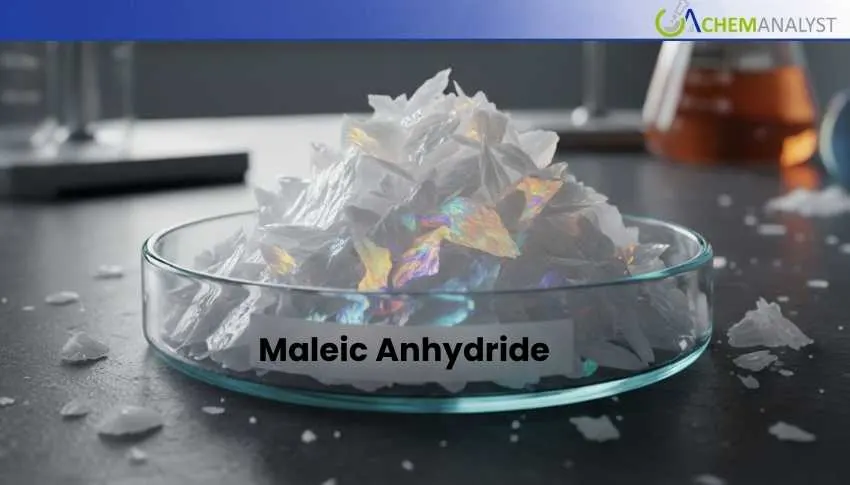Welcome To ChemAnalyst

In early November 2025, the maleic anhydride market exhibited a mixed trend globally. In the United States, prices remained firm on the back of steady demand from industries like coatings, construction, and automotive, along with balanced production and limited import competition. Feedstock costs were stable, too, which helped maintain price stability. In China, maleic anhydride prices went down about 2.2% because of increased supply from newly restarted plants and weaker demand from the unsaturated polyester resin sector. Though feedstock costs were higher, they could not counterbalance the oversupply and slow activity in the downstream sector. Overall, while the market in the U.S. remained firm and balanced, the Chinese market softened on weak buying sentiment and excess availability, reflecting regional differences in market fundamentals.
In the week ending Nov. 7, 2025, the global maleic anhydride market showed a mixed performance, with flat prices in the U.S. and declines in China. Maleic Anhydride prices in the U.S. were stable on account of comfortable supply-demand balance and continuous consumption from downstream industries like UPR, coatings, and automobiles. In comparison, the domestic maleic anhydride price in China showed a slight decline due to negative sentiment caused by growing supply and unenthusiastic downstream demand. The divergence reflects a regional contrast in production dynamics, inventory, and industrial recovery.
In the U.S., market stability continued during the period from the end of October to the beginning of November, and maleic anhydride prices were seen to be flat. According to ChemAnalyst, producers enjoyed balanced production and firm demand from the resin and coatings industries in the U.S. economy. The cost pressure from the feedstocks, especially n-butane, remained stable. Additionally, low import competition due to high tariffs on material coming from Asia relieved domestic producers from global price turmoil. The manufacturing activity in key sectors such as construction and automotive supported modest but stable demand for unsaturated polyester resins and, subsequently, provided a steady consumption backbone to maleic anhydride producers. As the supply and demand were in balance, no convincing bullish or bearish movement was recorded at all U.S. trading platforms.
In contrast, the Chinese maleic anhydride market softened during the same period and recorded a price slump of about 2.2% in the first week of November. The weakening trend resulted from unsuccessful domestic auctions and the partial completion of regional tenders, reflecting lukewarm buying interest. The restarting of several production facilities in Shandong province and the expected external sales from new plants in Fujian widened market supply. This increase in supply occurred against the backdrop of a weak performance in the downstream unsaturated polyester resin market, where a decline in resin prices was providing limited assistance to maleic anhydride producers. Despite strong upstream n-butane costs, sluggish demand conditions outweighed feedstock-driven cost support, compelling Chinese manufacturers to take a conservative pricing approach.
Broadly, the global maleic anhydride market entered November on divergent regional paths, stability in the U.S., fueled by consistent downstream demand and organized production, pitted against softness in China, driven by improved supply and weak end-use industries. Looking ahead, analysts said U.S. maleic anhydride prices were likely to continue to trade within a narrow range in the short term, barring any sharp feedstock cost or downstream consumption changes. Meanwhile, the Chinese maleic anhydride market was likely to remain under pressure from abundant supply and cautious trading sentiment, potentially leading to further mild corrections before stabilizing later in the month.
We use cookies to deliver the best possible experience on our website. To learn more, visit our Privacy Policy. By continuing to use this site or by closing this box, you consent to our use of cookies. More info.
